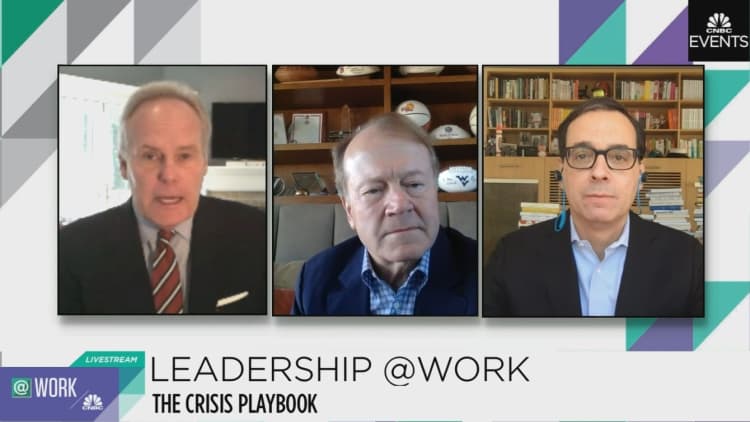The global outbreak of the coronavirus is creating significant challenges for leaders at organizations of all sizes. For many, this pandemic recalls the fear and uncertainty of the dot-com bust, 9/11 and the 2008 financial crisis. How leaders handle this crisis will quickly determine the good from the not so good, and will almost certainly dictate whether your company will come out stronger on the other side.
"If you're a leader, the first line of your obituary may be how you responded to this crisis," said Daniel Pink at CNBC's @Work livestream event "Leadership & Management Amid Crisis" on Thursday.
The renowned business thinker and author of best sellers "When: The Scientific Secrets of Perfect Timing" and "Drive: The Surprising Truth About What Motivates Us," added: "If you use that way of thinking about things, I think ultimately leaders will do the right thing for their company and for the world."
During CNBC's livestream event, many of the panelists offered insight on best practices when it comes to leading during a crisis. Here's what they had to say.
First and foremost, take care of your employees
Pink said one of the core imperatives for any leader now is to take care of their employees. "Make sure they're OK and make sure they have the tools and everything they need to be productive and be able to do their highest-priority tasks."
One of the most important things that you see in leaders who are in crisis is that they convey that we are all in this together.Daniel Pinkrenowned business thinker and best-selling author
Lazlo Bock, CEO of Humu, a platform that drives positive change in the way people and organizations work, agrees that employees come first in times of crisis. Bock, who co-founded Humu after serving as former senior vice president of people operations at Google, said the main soft skill people need to train on is empathy.
"At the start of every interaction, you just listen. People who are freaked out and scared are not going to be productive. They're not going to be effective. They're not going to move in any cohesive direction. And the human thing, the kind thing, the caring thing is to start with 'How are you doing? Let me just check in on you.' So empathy is the No. 1 thing people should be focused on right now."
Be honest
Pink also said that honesty is also paramount. "Right now I think there's a premium on candor, that leaders should be candid," he said. "They should be saying, 'I don't know.' They should be telling the truth as they know it. They should be human. Being human is enormously important here. ... We should never resort to corporate double-speak. This is one of those cases where talking like a human being is really important. I keep hearing of reports of companies that are firing people by robocalls, firing people by emails, that is the wrong thing to do."

Be fair
Pink said leaders must also avoid any perception of unfairness. "You want to avoid any notion that there are certain rules for people at the top and certain rules for people in the rest of the organization," he said. "One of the most important things that you see in leaders who are in crisis is that they convey that we are all in this together. And being all in it together means that everybody plays by the same set of rules."
Embrace flexibility
With the coronavirus triggering mandatory work-from-home policies across the world, it's realistic to assume that this will be the new normal — at least for a while. To that end, leaders need to be open to the idea of flexibility as employees try to figure out how to balance their workload with children underfoot.
"If your child suddenly needs you because of what happens in your life, or because they are not feeling well, then that employee needs to feel that they have the permission to reach out to their manager and say that they will be offline — for whatever reason," said Arianna Huffington, during the CNBC @Work livestream event.
The founder and CEO of Thrive Global added that employees need to be frank about what their needs are, and leaders need to embrace their challenges.
"One of the fundamental delusions that has been driving us all," said Huffington, "is that in order to be successful, we basically need to be on all the time. I think that's going to be completely sacrificed, because we are all seeing much more clearly the price we pay for that."






